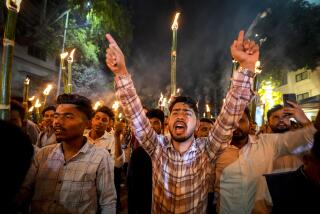Pakistan prisoner release confusion dashes Indian family’s hopes
NEW DELHI — The promise of a longtime prisoner’s release, a gesture meant to boost confidence between wary neighbors Pakistan and India, has left one family with dashed hopes and the Indian public in confusion after a mysterious mix-up.
Pakistani news reports said late Tuesday that Sarabjit Singh, 43, would be returned to his native India after 22 years in a Pakistani prison.
Convicted in 1990 of crossing the border and planting four bombs that killed 14 people in eastern Pakistan’s Punjab province, Singh was sentenced to death the following year. He has declared that he’s innocent, saying he crossed over by accident three months after the bombings.
News of his impending release sparked celebration across India, particularly in his hometown near the Pakistani border, and India’s foreign minister quickly issued a statement of appreciation to Islamabad.
Shortly after midnight Wednesday, however, Pakistani government spokesman Farhatullah Babar announced that there was “some confusion” and that a different man, Surjeet Singh, would be freed. Singh is a common name on both sides of the border and the two are not related.
Surjeet Singh, convicted of espionage, crossed over and was arrested in 1982. His death sentence was commuted a few years later to a 25-year jail term. Although that ended in 2010, he’s languished inLahore’sKot Lakhpat jail since.
Sarabjit Singh’s relatives, who were dancing, lighting fireworks and handing out sweets as many of their village’s residents prepared to meet him at the Wagah border, were devastated.
“We were awake late celebrating,” said Swapandeep Singh, 24, his daughter. “We were shocked.”
Sixty miles away, Surjeet Singh’s family experienced very different emotions. They were already jubilant because any release of an Indian held in Pakistan was cause for celebration, said his son, Kulwinder Singh. “But when we heard it was actually my father, we couldn’t contain our joy,” he added.
As of late Wednesday, neither had returned to India.
Both prisoners are from Punjab state, which shares its name with the neighboring Pakistani province, and lived within a few dozen miles of the border. The families have grown close over the years.
There’s much reported debate in India’s official circles over whether the Pakistani media made a huge mistake or one of Pakistan’s powerful security agencies pressured the government to reverse course, given the six hours it took Islamabad to correct the story.
On Wednesday, opposition Janata Party chief Subramanian Swamy called on the Indian government to sever relations with Pakistan, describing Islamabad’s action as premeditated and designed to toy with Indian emotions. Dawn, Pakistan’s leading English-language newspaper, has termed Babar’s clarification an “unusual U-turn.”
In video widely aired on Indian television, Rehman Malik, senior advisor to Pakistan’s prime minister, said the cases are distinct. He said Surjeet Singh’s release would take place within 48 hours and concern that the incident would hurt bilateral ties was baseless.
Malik said that Pakistan would also release 315 Indian fishermen guilty of straying into its waters in a bid for further reconciliation. Hundreds of soldiers, farmers and fishermen from each country are imprisoned by the other side, their fate often determined as much by political winds as due process.
In a related development, India’s arrest last week of Indian national Syed Zabiuddin Ansari, an alleged mastermind of the 2008 attack in the city of Mumbai that killed 166 people, sparked a war of words between the two nations Wednesday. Indian Home Minister Palaniappan Chidambaram said Ansari had confirmed Pakistan’s involvement in the attack, a charge Malik said was baseless.
“It is easy to blame us,” Malik said. “There is no evidence.”
A disappointed Swapandeep Singh said her father’s name was definitely on the Pakistani legal order, according to the family’s Pakistani lawyer, but was changed for some unknown reason.
“Only God knows what happened in the Pakistani offices, but I can’t rule out foul play or official mishandling,” she said.
Kulwinder Singh, who was 3 when his father was arrested, said he’s a bit nervous about meeting the father he’s never really known. “It’s been 30 years; we can’t even recognize each other,” he said. “For my mother, tomorrow can’t come soon enough. I’m hoping we’ll all be sharing a meal together in a few hours.”
Surjeet Singh’s family had no idea where he was after he disappeared, learning his fate only when an Indian prisoner who was released from Pakistan in 2005 brought a letter from him.
“We’d assumed he was dead,” the son said. “This is routine, Pakistan catching innocent people and calling them spies. My father was a farmer. He’s not a spy.”
Indian Foreign Minister S.M. Krishna appealed Wednesday to Islamabad to release both men, even as Sarabjit Singh’s family tried to regroup after the painful reversal.
“We remain hopeful,” said Swapandeep Singh. “We never give up hope. You can’t lose hope.”
Tanvi Sharma of The Times’ New Delhi bureau contributed to this report.
More to Read
Start your day right
Sign up for Essential California for news, features and recommendations from the L.A. Times and beyond in your inbox six days a week.
You may occasionally receive promotional content from the Los Angeles Times.






